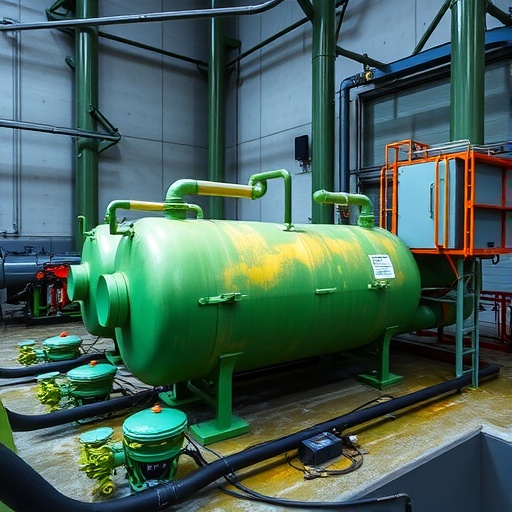In a groundbreaking study published in 2025, researchers have revealed significant insights into the utilization of kitchen and fruit wastes for bacterial cellulose fermentation. This innovative approach not only underscores the potential of waste materials in the realm of sustainable bioprocessing but also highlights the efficacy of hydrothermal pretreatment as a pivotal step in optimizing fermentation mediums. As the world grapples with escalating waste management challenges, the findings of this research could pave the way for more environmentally friendly practices in cellulose production.
The research team, comprised of experts in environmental science and biotechnology, meticulously examined the impact of hydrothermal pretreatment on various organic waste substrates. By leveraging the natural chemical properties of kitchen and fruit wastes, they prepared an ideal environment for the proliferation of cellulose-producing bacteria, which are essential in biotechnological applications ranging from food production to the development of biodegradable materials. The crux of their study was to test how different conditions of hydrothermal treatment could alter the physical and chemical structure of these organic substrates.
Hydrothermal pretreatment, a process involving the use of high-temperature water under pressure, was found to significantly enhance the digestibility of kitchen and fruit wastes. This method effectively breaks down complex lignocellulosic structures, facilitating the release of sugars that bacterial cultures can readily assimilate. By optimizing parameters such as temperature, pressure, and treatment duration, the study aimed to identify the optimal conditions that maximize cellulose yield while minimizing energy expenditure. The implications of these findings are vast, positioning waste-to-resource technologies at the forefront of sustainable production methods.
Additionally, the research delves into the specifics of the fermentation process itself. Bacterial cellulose, characterized by its high purity and unique structure, has garnered interest in the biomedical field for uses such as wound dressings and tissue engineering. The incorporation of hydrothermally pretreated wastes as a fermentation substrate may reduce the reliance on conventional raw materials, which are often associated with high environmental costs. This not only promotes a circular economy but also underscores the feasibility of transforming food waste into valuable bioproducts.
The researchers conducted extensive laboratory experiments, measuring various parameters throughout the fermentation process. They monitored bacterial growth rates, cellulose production, and metabolic by-products to comprehensively evaluate the performance of the different waste materials under investigation. The successful results underscore not only the functional benefits of hydrothermal pretreatment but also the capacity of diverse organic substrates to serve as effective fermentation mediums.
The study’s implications extend beyond just cellulose yield; they touch upon broader issues of sustainability and waste management. With food waste accounting for a significant percentage of global landfill contributions, finding innovative solutions to repurpose these materials could drastically mitigate environmental impacts. The findings present an enticing avenue for industries to not only reduce waste but also convert it into economically beneficial products, enhancing both environmental and economic sustainability.
As the research progresses, the authors are optimistic about the potential adoption of their methods on an industrial scale. The study discussed implications for scaling up production processes, including the design of bioreactors specifically tuned for hydrothermally pretreated waste substrates. This could accelerate the transition to a more sustainable, bio-based economy, where waste serves as a valuable resource rather than an environmental burden.
The research community’s enthusiasm is also piqued by the interdisciplinary nature of this study. It not only contributes to the field of microbiology but also intersects with environmental science, engineering, and economics. Future research could expand upon these findings, exploring new waste streams or enhancing the genetic engineering of bacterial strains to further optimize cellulose production.
The intricate web of interactions involved in the fermentation process, particularly under varying conditions of hydrothermal pretreatment, suggests a complex yet fascinating dynamic. Investigating these interactions more profoundly could unlock further efficiencies and improvements in bioprocessing technologies, thus broadening the horizons of waste utilization.
As awareness of the benefits of bacterial cellulose continues to grow, industries might begin to look more seriously at the potential of integrating these findings into their operations. By adopting practices that valorize kitchen and fruit waste, businesses could effectively contribute to global sustainability goals while simultaneously fostering innovations in product development and application.
Moreover, the establishment of robust partnerships between academia and industry could be crucial in facilitating the rapid transition from research to application. Engaging stakeholders across the supply chain may ensure that the methodologies and practices proposed by the study are practical and economically viable, thereby increasing the likelihood of adoption.
In summary, the transformative approach outlined in this research shines a light on the vast potential of utilizing kitchen and fruit waste in bacterial cellulose production. With hydrothermal pretreatment serving as a pivotal method to optimize fermentation conditions, the prospects for creating a more sustainable future through effective waste management and resource utilization have never seemed more promising. As this area of research continues to evolve, one can only imagine the incredible applications and innovations that lie ahead.
Subject of Research: Utilization of kitchen and fruit wastes for bacterial cellulose fermentation using hydrothermal pretreatment.
Article Title: Evaluation of the Effect of Hydrothermal Pretreatment on Kitchen and Fruit Wastes for Bacterial Cellulose Fermentation Medium.
Article References:
Nasharudin, M.I.H., Kee, C.G., Rahim, M.H.A. et al. Evaluation of the Effect of Hydrothermal Pretreatment on Kitchen and Fruit Wastes for Bacterial Cellulose Fermentation Medium.
Waste Biomass Valor (2025). https://doi.org/10.1007/s12649-025-03346-5
Image Credits: AI Generated
DOI:
Keywords: Hydrothermal pretreatment, kitchen waste, fruit waste, bacterial cellulose, fermentation, sustainability, bioprocessing, waste management, circular economy, biotechnology.
Tags: bacterial cellulose fermentation from kitchen wastebiodegradable materials production from wastecellulose-producing bacteria in fermentationeco-friendly practices in biotechnologyenvironmental impact of waste fermentationfruit waste utilization in biotechnologyhydrothermal treatment in waste managementinnovative waste treatment methodskitchen waste recycling strategieslignocellulosic biomass conversionoptimizing fermentation mediums for cellulose productionsustainable bioprocessing techniques





